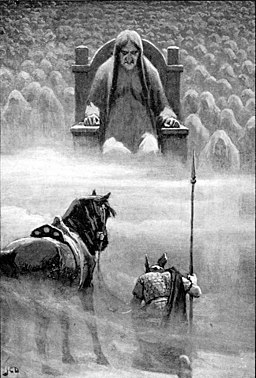Ahhhhhhhhhh! Just ONE WEEK until Daughter of a Thousand Years releases! On that note, another Norse post! It is maybe possibly semi Valentine's Day thematic? Kind of? You can decide for yourself, I suppose -- but here are my thoughts on Hel and the Norse Afterlife. (Also I totally especially recommend reading the footnotes on this one.)
One of the monstrous children of Loki, according to Snorri in the Prose Edda, Hel is "half black and half flesh-colored." She was given the rulership of Niflheim and all those who die of sickness or old age -- meaning pretty much everyone who didn't die with exceptional glory in battle, with the possible exception of those who were lost at sea.***
 |
| Hermod before Hela (via Wiki commons, PD) |
[Those who DID die gloriously in battle might be swept up by the Valkyries, or perhaps Freyja and brought to Asgard to live on drinking and battling for funsies in Valhalla (with Odin) or Folkvangr (with Freyja) until Ragnarok. However, a poem from the Poetic Edda, The Hárbardsljód, suggests Thor might have had a hall for the souls of peasants and thralls, so maybe it wasn't only the glorious died-in-battle nobles who got a more um. pleasant? afterlife. It's hard to say for certain -- but we definitely shouldn't confuse the idea of Valhalla with the Christian idea of Heaven.]
In any event, if the exceptional deaths got the Valhalla/Folkvangr upgrade, it was only the second class deaths that went to Hel* which was by most accounts a pretty dismal place, in particular this stanza in the Voluspa describing part of Niflheim is pretty bleak**:
38. A hall I saw, | far from the sun,On Nastrond it stands, | and the doors face north,Venom drops | through the smoke-vent down,For around the walls | do serpents wind.
I don't know about you, but with that as my other option, I'd definitely be more inclined to consider running myself straight toward someone else's sword in heroic battle. Especially if the woman who greeted and embraced me should I die of old age or illness was only half human flesh. Half-alive, even. But what if her appearance is more than just the indication of her monstrous birth -- the child of Loki and the Giantess, Angrboða -- and potential threat to gods? What if it signifies the grief of loss? Of the women who were left behind when their husbands went out as Vikings and never came home again?
Sure, their bravest and boldest men went to Valhalla to be waited on by Valkyries, or got to dance their nights away with the goddess Freyja (by all accounts, very beautiful and highly sought after as a bride by the frost giants, who are obsessed with marrying her) but those women, who did not or would not die in battle had lost their men and sons for eternity. There was no hope of reunion when the dead were divided so absolutely in the afterlife.
What if Hel is the representation of their heartbreak, their suffering, their grief, in knowing they will never embrace their loved ones again? For that matter, it could be the representation of all loss of that nature. The husband's loss of his beloved wife and child in childbirth -- when just hours earlier the world had been full of life and promise, now cruelly stripped away, there is only a half life left, while stumbling through grief.
It seems likely to me that Hel, responsible for those kinds of deaths, would embody their suffering physically as well. But what a miserable existence, taking charge of so many forsaken spirits. And having been forsaken by the Aesir, to rot with Hel in Niflheim, is it any wonder that the dead in her domain rise up against the gods in Ragnarok?
Perhaps it's their grief that makes them do it.
***There's also an idea of a family mound -- a burial place NOT in Niflheim, but perhaps within your own property, where your soul would reside with your ancestors and family members. So perhaps of the sick and old-aged, it was only those whose bodies were not laid properly to rest or given the proper rites who resided in Hel's domain -- the forgotten and the exiled and the outlawed would certainly make a sorry bunch. Since family and community were so important, the foundation of society really, this would make a lot of sense to me. I incorporate both the idea of the Mound and Thor's hall for peasants in DAUGHTER OF A THOUSAND YEARS.
*In those days, a good many of those who would have died of sickness were probably women and children, most especially in childbirth. Norse women could and did go off to plunder and fight as vikings, with new evidence suggesting they were more prevalent in those parties than we previously thought, but childbirth was dangerous then, and there was no telling what was on the other end of a pregnancy -- life or death. The idea of Hel as half alive and half dead, then, is rather fitting. It almost seems to me as though every woman had one foot in the grave in those days, especially if she was married and bearing children.
** This sounds to me like the place where Loki is bound, what with the venom dripping down into his face and eyes and the presence of the serpents. But there isn't any real specific information on where Loki was imprisoned, and since when he writhes against his bonds he causes earthquakes, it seems to me that implies he's trapped beneath Midgard somewhere. Maybe that's where Nifleheim is, though. It's hard to say how it all maps out.
You can pre-order print, kindle, or audiobook! Daughter of a Thousand Years is almost here!!! Ahhhhh! And don't forget you can still enter to win one of 100 kindle copies on Goodreads, or join us for the blogtour beginning this Thursday!
You can pre-order print, kindle, or audiobook! Daughter of a Thousand Years is almost here!!! Ahhhhh! And don't forget you can still enter to win one of 100 kindle copies on Goodreads, or join us for the blogtour beginning this Thursday!




Amazon | Barnes&Noble | IndieBound


This is fascinating! Your theories about Hel make a lot of sense. I also like the idea that only those who weren't buried in a family mound or given the proper rites were sent to live with Hel. Granted, I haven't studied her as of yet, but I almost feel sorry for Hel. What a burdened existence she must have.
ReplyDeleteWell. I'm not sure how to feel about her -- if I feel sympathetic or not, etc. I mean, ultimately she became part of the force which brings about the end of the gods, and she has opportunities to show kindness and grace but chooses not to. But. Is all of that the result of her being placed into this role by Odin or was it just who she was? It's hard to say. All Loki's children are kind of opaque in that way, I feel like, and there's a lot of "if this is fated, how much control did they have over their own lives and the shaping of their own characters?" to confuse the issues even more.
Delete